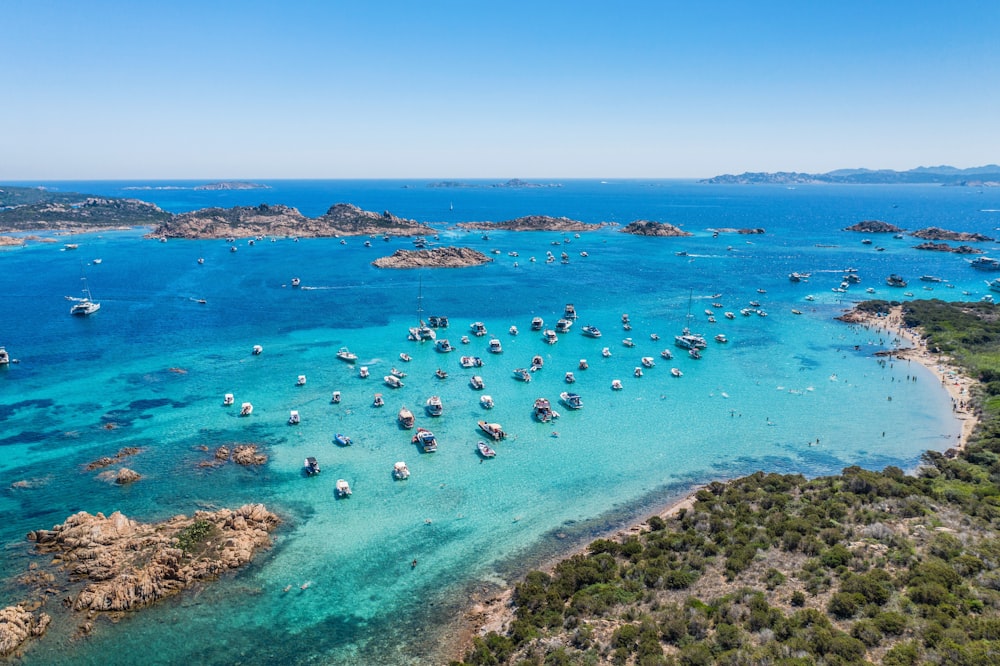
It's no secret that people in Japan, Sardinia, and Costa Rica live the longest. What is it about their lifestyle that promotes health? And what can Canadian adults aged 40+ learn from them?
Achieving a long and happy life doesn't have to be complicated. In fact, according to long-life researcher Dr. Luigi Fontana, living an active lifestyle with many social connections has been shown to promote longevity across different parts of the world. But there are other factors that he believes contribute heavily to living longer than anyone (such as diet).
So, how do we adopt a life full of healthy habits to live long?
"The Secrets to Living a Long, Happy, Healthy Life," according to Dr. Luigi Fontana
You may or may not have heard of Dr. Luigi Fontana, but he is a world-renowned author of the book "The Path to Longevity: The Secrets to Living a Long, Happy, Healthy Life" and expert on longevity. He is an Italian researcher and double board-certified physician in internal medicine and specialized in geriatrics and clinical immunology. His areas of expertise include long-term effects of calorie restriction, obesity, physical activity, stress reduction and nutritional supplementation on human health and longevity.
He has published over 130 peer-reviewed articles since 1998 in the field of ageing research with a focus on mechanisms underlying healthy longevity at different ages. As such, he's uniquely qualified to speak about how we can apply their findings practically to our lives here in 2015.
So… How do we adopt a life full of healthy habits to live long? And if you're curious about what the longest living people in the world are doing differently from us… then stick around!
The so-called "blue zones."
Blue zones are certain regions or areas of the world where people live exceptionally long, healthy lives. They may also teach us a thing or two about living well beyond just losing weight.
Japan, Sardinia, and Costa Rica are just some of the geographic regions where people live not just longer but better. These places are so important because they reveal what humans are capable of if we take care of ourselves in the right way. They show us not only how long people can live, but also at which ages it is possible to be healthy and productive before succumbing to any sickness or old age.
People From Okinawa, Japan
People who live in Okinawa, which is located between mainland Japan and Taiwan, are some of the healthiest people on Earth. They have one of the highest life expectancies in the world—about 86 years—and they spend about half as much money on healthcare as Americans do.
One study showed that 90 percent of Okinawans over age 65 had no signs of dementia or cognitive impairment at all. Another study found that Japanese women who grew up in Okinawa but then moved away to the mainland still lived longer than other Japanese women by several years.
The people who live in this city tend to follow a certain set of habits that other people in the world should emulate to live longer.
People From Sardinia, Italy
People in Sardinia, Italy, are the longest-living people in the world who have one of the highest life expectancies as well.
They have an average life expectancy of 85.7 years, with men living until around 80 on average and women living until 86 or 87 on average.
Given Sardinia's proximity to Corsica, one can't be surprised that there's so much crossover when it comes to traditions--especially food-related ones. Especially because Corsica is part of France, and Sardinia is just a boat ride away.
With strong ties to North Africa, many people in Corsica both eat and cook like it's the Maghreb; tagine stews are particularly popular. The French influence on the island can be seen in cheese production (the "Casu marzu" casu whey) and Armagnac liquor production (for special occasions). But even with all this Gallicization, freshly baked bread (focaccia), wild boar stews ("cozze"), fig jam tarts ("figatellu") and cannoli-like biscotti remain staples of everyday life for most inhabitants.
Some experts believe that lifestyle factors are the most likely explanation for these long lifespans.
People From Costa Rica
Citizens of Costa Rica have a life expectancy of 79, making them the third-longest-living people in the world.
Their diet is said to be one reason why they live so long with low rates of heart disease and dental cavities but the high consumption of fruit as well as Omega-3 fatty acids from fish, which many believe contribute to their healthy hearts.
What do they have in common?
But, what do these three populations have in common that they had more success than others in improving their chances of living a long life full of good health?
There are several answers to this question. However, the most important one is that their approach encouraged them to eat more plant-based foods and avoid other foods including animal products as much as possible. This contributed greatly to improving their health before reaching old age, which they were able to do without any chronic conditions or diseases.
Healthy Habits of the Longest Living People in the World
Imagine having the opportunity to live up to 100 years—without succumbing to any sickness or old age.
It may sound like something out of a fairy tale, but it's actually possible for some people around the world who follow specific healthy habits that promote long life and good health.
The above-mentioned three populations, in particular, among other blue zone regions, have been studied extensively because they have managed to remain active into their 80s and 90s despite often living in less-than-ideal socioeconomic conditions.
Here are some of the key healthy habits of the world's longest-living people.
1. Eating in small portions or in moderation
Older Okinawans practice something called "Hara Hachi Bu," which means they eat until they are about 75 to 80% full and then stop. They tend to eat small portions and don't overeat as many people do. They say it's about enjoying their food more, rather than stuffing themselves.
2. Having a diet high in vegetables and fruit
People from the healthiest city in Japan also eat mainly plant-based foods, such as tofu, fish, and seaweed soup; local rice; and vegetables such as bitter gourd and green leafy Chinese cabbages. They drink herbal teas sweetened with honey instead of sugar or artificial sweeteners.
Eating an anti-inflammatory diet--favouring lots of veggies and fruits over meat and dairy products like cow's milk is also their key component to a healthy way of eating.
3. Diet: Fish, local cheese, no processed sugar, red wine
The people in Sardinia eat a lot of whole foods like fish, especially tuna, local cheese and yogurt made from sheep's milk which they often pair with their meals.
Also, they typically don't eat processed sugar either since it is hard to come by on the island. They do use honey though as a sweetener instead of refined sugar.
In addition to that, Sardinians also avoid artificial ingredients whenever possible and drink red wine (in moderate amounts) daily.
Eating right gives you more energy so you can complete tasks easier and feel less drowsy as the day goes by.
4. They sleep well and take naps
The people in blue zones were reported to get a lot of sleep compared to other parts of the world, averaging about 10 hours a night. They avoid staying up late at night and waking up early in the morning and instead take regular afternoon siestas and afternoon naps to recharge their bodies throughout the day.
Furthermore, for many people, having a bad night's sleep can lead to symptoms that mimic depression and anxiety.
Regularly not getting enough sleep has been shown to reduce the body's ability to resist viruses and bacteria, which might contribute to feelings of sickness and tiredness.
Getting enough sleep helps improve memory, creativity, and decision-making skills because the brain has adequate time to rest and recuperate. It also makes sure that all your body systems are running smoothly, thus helping prevent any health problems (and resulting frustration) later in life.
5. Staying active: exercise and walk around
After a long day at work or school, many people just want to sit down on the couch and relax their weary bodies, but this will only worsen an already stressful situation. Staying physically active can significantly reduce stress levels, so it would be best for you to either go for a quick walk around the neighbourhood or hit the gym for some weightlifting.
Everyone on Okinawa island knows that exercise is extremely important for keeping your body healthy. However, living an active lifestyle doesn't mean that you have to spend countless hours in a gym or running miles per day like most Americans do nowadays doing intense workouts several times a week- it simply means staying active every single day. That's why the majority of the world lives a more active lifestyle and exercises by using their own body weight as resistance and by taking walks throughout their island.
One study found that those who exercised for at least 150 minutes per week were less likely than others to report symptoms of depression.
However, it is unclear if exercise causes the decrease in symptoms or if these symptoms are related to other factors such as eating healthy food. For instance, those with symptoms were more likely to smoke and consume caffeinated drinks.
6. Not smoking and not drinking alcohol excessively
Blue zone or not, this healthy habit is one of the most common health rules that people follow to live a healthier, longer life. Studies have shown that this is one of the most prevalent habits in Blue Zones as well--with all five blue zones having a very low percentage of smokers and alcohol consumers.
7. Having a sense of purpose
This is yet another extremely important habit followed by long-living individuals from all around the world. In fact, it has been shown to be linked to living a healthy lifestyle because those who don't have any goals or interests in life generally lead unhealthy lives. Survey says that they (don't have any goals or interests in li) also tend to be less satisfied with their lives and generally have poor mental health as well as physical conditions.
Many of the longest-living people have a reason to keep going. They have something important to do, whether it's taking care of their family or following through with their dreams until the end, they all have a purpose that they don't want to let go of even if they were given a limited time left on Earth. Having a purpose makes one not become easily depressed because there is always something that keeps them going – even if it's just living another day!
8. Being social staying connected to the community
Staying connected to the community is something that has been reported by people living in the blue zones. They tend to make new connections with neighbours, colleagues, customers etc., on a daily basis which helps them feel connected (to others).
These new relationships act as networks of social support. Social support which comes from these relationships helps reduce stress levels and makes you feel more supported, thus improving your mental health tremendously. This also contributes to leading an active lifestyle because one would be motivated to partake in physical activity with their buddies instead of wanting to sit at home all day doing nothing.
9. Keeping stress levels low by practicing meditation or yoga regularly
Many of the longest-living individuals in the world practice meditation every day. Meditation or yoga are great stress relievers that are healthy and are not expensive. Yoga makes the body more flexible while meditation helps de-stress. Together, they make a great exercise for your mind and body.
10. Focusing energy on the important stuff
The Sardinians say they reserve most of their energy for important things such as working around the house, hanging out with family and friends, or only staying up later than usual to relax by watching a movie with snacks on the couch at night.
The trick is to focus on doing and spending time with the most important stuff.
Life is short, and you need to be present in it. Sardinians understand this tip perfectly well.
11. Having a positive outlook on life
This has got to be mentioned because research shows that people who live with a positive attitude simply live longer than those with a negative one You can't change your DNA, but there's plenty of research showing how important it is to maintain an optimistic mindset when trying to live a healthy life. Trust me, this is a good one to have on your side!
12. They enjoy the outdoors
They typically take long hikes either up mountains or along beaches which have been shown to help improve cardiovascular health, control weight, improve muscle strength and bone density, help prevent obesity and osteoporosis, reduce stress levels, elevate moods better than prescription medications, enhance brain function both short-term and long- memory retention abilities, increase creativity levels, and much more.
13. Investing in spirituality
The longest-living people are those who have a strong faith and devote much time and energy to their spiritual community.
Participating in regular faith-based services, potlucks, or other methods to develop social connections with others who share similar beliefs might be one way to do so. Having faith and a support network of people who believe the same things as you can help you deal with sadness, pain, suffering, and disappointments that are all part of life.
Spirituality can be described as a religion, but it does not always have to be so. Rather, it's about believing in something greater (or beyond) oneself.
14. Don't bother holding on to things that are out of your control
Many people often complain about the things that they cannot change. We attempt to adjust our thinking in order to be happy, but end up discouraged when we realize that it is not possible. We all must learn how to let go of whatever bothers us and take comfort in what we already possess—our own selves.
15. Make time for yourself daily so you can keep learning new things
You should never stop learning because life goes by faster than you think. Set aside an hour each day where you do something productive or fun, alone with no distractions. This will help you better adapt if one day you lose the ability to do certain tasks!
16. Have a good, kind heart
Be good to yourself first, then be good to others. Stop taking everything so personally and try your best to do what you think is right. Do not take advantage of anyone—not even if it's just a joke! Strive to understand other people's positions before acting on anything. If you maintain this approach, you're guaranteed to have less stress in your life.
17. Be thankful for the smallest things
Grateful people are happier, healthier, more active, more social, etc.. Remember that everything has its reason—even the bad things! You might say that these "bad" things are preventing one bigger thing from happening—and maybe that bigger thing is something amazing! When you feel discouraged about something small, try to count your blessings.
18. Have willpower
Doing what you think is right instead of what others want is easier said than done! You might be surrounded by people who discourage or even prevent your efforts to do good for yourself, your family, and the world—don't give up on yourself! The more willpower you have, the better your attitude towards life. Be stronger than "the puppets."
19. Get a new pet
Please don't get a pet for the sake of getting one. If you bring home an animal, it should be because you want to (not because you feel like you owe somebody something). If you are not ready for the responsibility—shouldn't buy or adopt one.
20. Listen to your intuition
Are you headed in the wrong direction? Is something about to happen that will hurt somebody? Does this new person seem suspicious? Your gut feelings are more than just "gut feelings" - listen to them! And if something doesn't seem right, get away from it! You don't need or owe anybody anything … especially not someone who is making your instinct tell you "run!"
21. Enjoy pleasure without guilt
Too many people are so hard on themselves for enjoying life. Too many people feel guilty or selfish if they do something fun, or eat something delicious, or have a drink, or talk to someone attractive—and the list goes on! There is no reason to deprive yourself of pleasure. Do you really think that it is possible to enjoy life 100% of the time? Be happy with who you are and what you've got … celebrate your individuality! And if that means having some ice cream once in a while - go ahead! You deserve it!
22. Try a new hobby
You may be busy, but it's worth trying to have some fun and relax at the end of a long day. We really encourage you not to just sit in front of your TV and vegetate (spend time not doing anything or remain in a dull, inactive way).
Try to get out there, do something interesting and meet new people! Maybe learn a new language or take up some painting classes if that's what makes you happy. The more active you are, relieving your daily stress, the healthier you will be, for sure! T here is nothing more liberating than trying out something new that can bring joy into your life! Making time for pleasure reduces stress too!
23. A little sun won't hurt!
Soaking under the sun has some benefits too. Get out there, at least for 20 minutes a day. Vitamin D strengthens your immune system and regulates different cells in your body, while you are protected from diseases by the ozone layer filtering ultraviolet rays. This means that if you want to live into ripe old age, try to spend 10 minutes of your day outside!
24. Be light on yourself
Cut yourself some slack when it comes to working, sticking to healthy habits (yes, healthy habits!) etc. Don't be so hard on yourself- it is perfect! You can make mistakes, and that's fine, we all do it! We only live once and you should make the most of this one life- so lighten up and try to learn from your mistakes. Don't beat yourself down with them!
25. Laugh More
Laughing is great for your health as well as for making you feel happy. You can even laugh at yourself too or just watch some funny videos online if you don't have anyone to laugh with…
No matter what though, find time in your day to let loose and enjoy a good old belly laugh. It will help decrease stress levels--which will automatically improve your health!
Live longer, healthier, happier!
Of course, it doesn't mean that we need to move to the blue zones like Japan to achieve the results ourselves. It's no secret that living a healthy lifestyle is the key to longevity.
The key to living a long, healthy life is making it your priority. All of these habits are simple ways that you can incorporate into your daily routine for better health and longevity. They may seem like common sense, but they really work! What do you think?
Do any of these twenty-five tips resonate with you more than the others? If so, which one was most surprising or intriguing to you? Let us know in the comments below!















